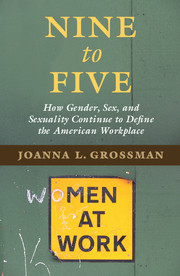Foreword
Published online by Cambridge University Press: 05 May 2016
Summary
Joanna Grossman wrote the essays collected in this book during fifteen years as a biweekly columnist for the online legal publications Justia's Verdict and FindLaw's Writ. Of the 350 columns she produced during those years, she has selected 57 dealing with the law of women in the workplace. Each one combines a lively presentation of the facts of an actual legal case decided by an American court with an exemplary analysis of its implications for the law of sex discrimination in employment.
Because the chapters were written under deadline and in the moment, they have the immediacy of the best journalism. Yet taken together, they could well serve as part of a scholarly history of the legal women's movement in the opening years of the twenty-first century. The reader can follow the law's development from earlier cases that raise questions about the fundamental nature of sex discrimination to later ones that wrestle with conflicting sophisticated theories about the functioning of workplaces and markets.
Perhaps the most interesting part is the one on sexual harassment, a form of discrimination first recognized in modern times, though a feature of women's experience from the earliest days of their regular employment outside the home. Many of the cases combine dramas arising in the increasingly gender-integrated workplace with the repeated challenge of resolving competing claims of “That's sexism!” and “No, it is just life!”
For instance, a stenographer in the writers’ room of the wildly successful and mildly raunchy sitcom Friends complained that the flood of sexual allusions and crude language that saturated her workaday world made it inhospitable to her as a woman. The employer responded that such loose talk was inevitable among comedy writers and indeed a “creative necessity” if they were to do their work successfully. The plaintiff lost, but the court left open the possibility that such a barrage of sex talk, if aimed at a particular woman, could indeed be a basis of a sex discrimination claim. Hovering over the case, but barely to be found in the lawyers’ arguments or the judges’ opinion, was the real-life fact that comedy writing was at the time (as it may be still) mostly a man's game, and a lucrative one, too.
- Type
- Chapter
- Information
- Nine to FiveHow Gender, Sex, and Sexuality Continue to Define the American Workplace, pp. xi - xiiPublisher: Cambridge University PressPrint publication year: 2016

